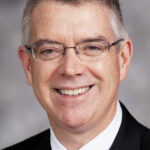April 10, the day after Easter, is the 25th anniversary of the Good Friday agreement that ended 30 years of life-shattering sectarian violence in Northern Ireland. The passing years have not been trouble free. The painstaking, ongoing work of fostering peace and reconciliation continues today in Northern Ireland through the efforts of people like Brian McKee, a widely respected peace and reconciliation leader who spoke recently in Davenport. We would do well to follow his example in striving to foster peace and hope here in Iowa and across our nation.
McKee spoke in mid-March during the “Pope Francis at Ten conference” at St. Ambrose University in Davenport, where he told his audiences that peace isn’t something you declare and then walk away satisfied. It involves daily practice, patience, perseverance and a willingness to listen to and collaborate with people we may perceive as enemies.
The “Troubles,” which began in 1969, had a profound effect on McKee, who was 10 years old at the time and growing up in Ardoyne district in north Belfast. “No community suffered more deaths (99) in the long conflict than this parish,” he said in his talks. He recalls going to bed at night and thinking that “If I go to sleep, I won’t feel it when those men shoot me.”
McKee survived the Troubles and grew up to embark on a career of teaching, retreat work, youth ministry and a lifelong commitment to the work of peace and reconciliation. “It seems that the hearts of many good people get wounded and hurt as we strive to satisfy the demands and expectations of others,” he said, reflecting on his life’s work. He exhorts us to acquire reflection skills and to hold ourselves accountable to our own life vision and personal values. Through these practices, “we can gain a strength and a compassion that is liberating to both ourselves and to those with whom we share the sacred ground of our life experiences.”
Today, he is the director of Seedlings, a consultancy on pastoral renewal, youth ministry and reconciliation. He works with the Holy Cross Parish in Ardoyne, the parish of his childhood. He also does retreat work and is especially committed to helping at-risk youths who are recruited by gangs because of their vulnerability. McKee helps them to build on their talents and their skills and to apply them to healthier, productive outlets. Their successes reflect the hope that his faith ingrained in him.
McKee points to the necessity of straddling political, religious and socioeconomic divides and takes the risk of alienating people who think he should be on their side, says Mara Adams, a theology professor at St. Ambrose University. Belfast is still a divided community. However, McKee and his colleague, Father Gary Donegan are in dialogue with the Protestant community, she notes. McKee chooses hope over despair or apathy.
We, too, must choose hope over despair or apathy in our interactions with others. We, too, must resist the temptation to avoid meaningful dialogue with someone whose values and beliefs conflict with ours. “At times, the frantic pace of the modern world prevents us from listening attentively to what another person is saying,” Pope Francis says. “We must not lose our ability to listen,” he advises us in his encyclical, “Fratelli Tutti” (No. 48).
Rejection and ridicule are risks that Jesus took in his ministry, in his interactions with others and in his invitation to hope and eternal salvation. “We can choose to be people of faith. Faith not only in the God above but faith in His promise of a deep and lasting peace for all,” McKee said in an essay for “Irish News” in 2013 reflecting on the 15th anniversary of the Good Friday Agreement referendum. “No matter how we view those still engaged in violence, they are people with hopes and hurts, dreams and disappointments. They still love, get sick, cry and laugh. They have children and their loved ones die. We are dealing with people, and people can change. But do we believe the Gospel message of redemption for all as we face the future together?”
That is a question for all of us to reflect on this Easter season as we celebrate of the hope of our faith.
Barb Arland-Fye, Editor












